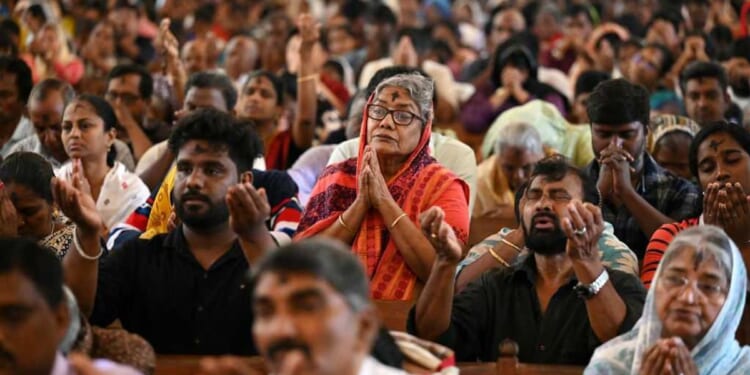President Trump’s recent warning to Nigeria over the mass killing of Christians was both overdue and necessary.
At long last, Washington acknowledged what much of the West preferred to ignore — that believers are being butchered for their faith while bureaucrats issue statements and move on to the next photo op. Trump’s threat to strike Nigeria if the slaughter continues signaled a rare thing in modern politics: moral clarity.
Every church burned in India is a warning: Faith without freedom becomes folklore.
Now it’s time for that same clarity to be turned toward another nation, one that calls itself the world’s largest democracy and one that America counts among its closest allies — India.
New data from the United Christian Forum reveals a troubling trend. Attacks on Christians in India have surged by more than 500% since Prime Minister Narendra Modi’s Bharatiya Janata Party came to power in 2014. Over the course of a single decade, reported incidents climbed from 139 to 834. Nearly 5,000 individuals, families, and churches have been caught in the crossfire.
Yet these grim numbers tell only part of the story.
Behind the statistics are pastors dragged from pulpits and beaten, churches reduced to ash, and people hunted like animals simply for choosing the Lord Almighty over the golden idols of their tormentors. What was once unthinkable — open persecution of Christians in the land of Mother Teresa — has now become routine.
Twelve of India’s 28 states now enforce so-called “anti-conversion” laws that criminalize anyone accused of bringing others to Christ.
In practice, these laws are less about conversion than coercion. They empower mobs and police alike to harass Christian minorities on suspicion alone. A man caught carrying a Bible can be accused of proselytizing. A prayer meeting can be framed as a plot.
The cruelty is not confined to law but seeps into everyday life.
In the heartland states of Uttar Pradesh and Chhattisgarh, Christian villagers have been driven out of their homes, denied burial rights, and told to renounce their faith or face starvation. Dalit and tribal Christians — the poorest of India’s poor — endure the worst of it. They are excluded from government welfare programs, denied housing, and forced into reconversion ceremonies designed to humiliate.
The Hindu nationalists behind these acts are not the flag-waving patriots America knows. They are absolute savages who have more in common with Islamist extremists than with any conservative movement in the West. No evil is too depraved for these fanatics in saffron robes. These are men capable of gang-raping elderly nuns in the name of purity. Their mouths recite prayers even as their hands commit sin.
Yet through all this, Washington has remained curiously quiet. India, after all, is an ally — a key counterweight to China, a trading partner, a member of the Quad alliance. And allies, we’re told, must not be offended. India receives tens of millions in U.S. foreign assistance each year, yet continues to slide deeper into majoritarian extremism.
RELATED: Bill Maher’s shocking defense of Christians — and what it reveals

The relationship has become a study in contradiction: America exports democracy while subsidizing the suppression of it.
Trump’s stance toward Nigeria was bold because it rejected the idea that diplomacy must always defer to decorum. He recognized that moral authority is not something declared but something earned and easily lost. The same logic applies to India. If America’s partnership with New Delhi is to mean anything, it must rest on shared principles — not selective blindness.
There is a tragic irony in watching the world’s oldest democracy bankroll the world’s largest, while both ignore their founding creeds. Trump is uniquely positioned to change that. The president has shown a willingness to name the unnameable and confront regimes that others tiptoe around. His threat to Nigeria rattled the corridors of Abuja and forced the international community to pay attention.
A similar message to New Delhi — that America’s friendship cannot be a blank check for intolerance — would carry enormous weight.
To speak out would not be an act of hostility but of honesty. True allies do not flatter; they challenge. India’s leaders must be reminded that religious freedom is not a Western import but a universal right, and any nation that denies it will pay the heaviest of prices. If India wishes to stand shoulder to shoulder with the free world, it must first show it belongs there.
For too long, the West has treated persecution as someone else’s problem. But every church burned in India is a warning: Faith without freedom becomes folklore. The indifference of powerful nations emboldens tyrants and teaches them that human rights are negotiable.
The question now is whether America still believes in the principles it preaches — and whether Trump will demand that its allies do the same.
Because faith, like freedom, dies in stages — first ignored, then excused, and then erased. The erasure has already begun in India. What’s needed now is not another summit or statement, but a voice loud enough to pierce the silence. President Trump has that voice, the rare kind that can still move mountains. I, for one, hope he uses it.

















